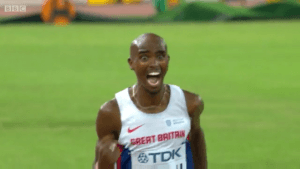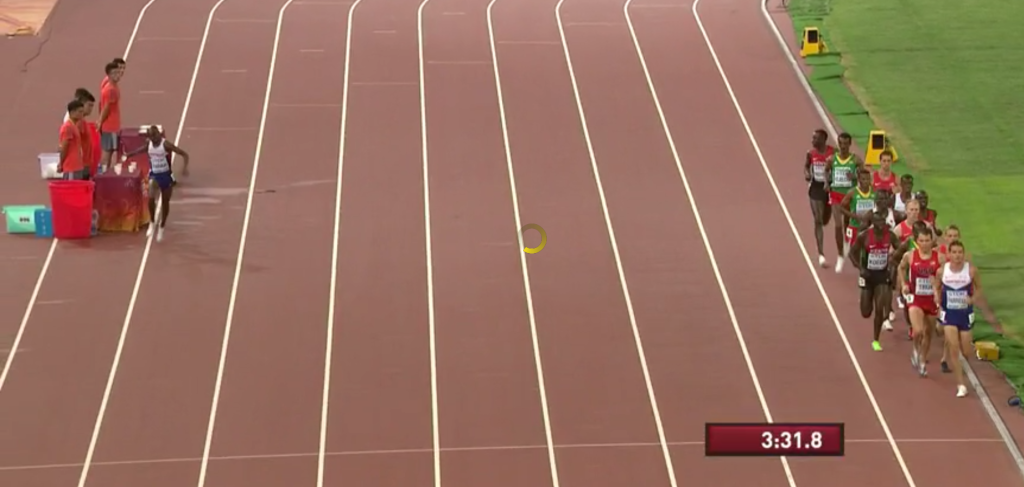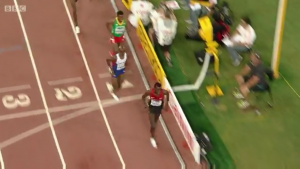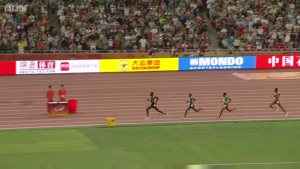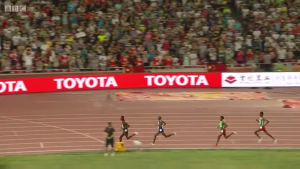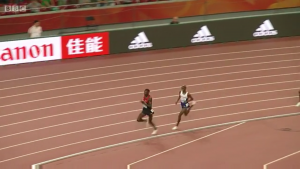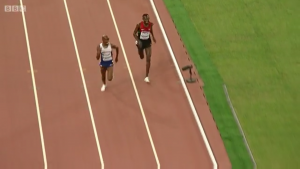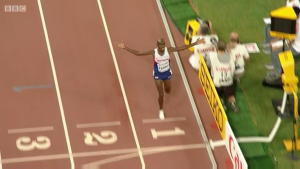Seventh Heaven: Mo Farah Captures 7th Global Title, Becomes First Man To Complete The 5000/10,000 Double Three Times
Farah’s Last 1km Is Fastest in Championship History, Winning Time is Slowest in Championship History
By LetsRun.com
August 29, 2015
BEIJING – Britain’s Mo Farah made history tonight at the Bird’s Nest stadium by using his blistering kick to finish off the field and become the first person to win a third World title at 5000 in 13:50.28.
Farah finished off the field with a last lap of 52.5, last 800 of 1:48.6, last 1k of 2:19.20 and last 1600 of 3:55 to win the men’s 5000 in 13:50.38. Kenya’s Caleb Ndiku, who actually had the lead with 100 to go ended up holding on for a much deserved silver in 13:51.75, as Ethiopia’s Hagos Gebrhiwet got the bronze in 13:51.86 just ahead of last year’s world junior champ Yomif Kejelcha (13:52.43). The three Americans in the final all acquitted themselves well as Galen Rupp, Ben True and Ryan Hill finished 5th (13:53.90), sixth (13:54.07) and seventh (13:55.10) respectively.
Farah made history a number of ways. Counting the 2012 Olympic results, Farah has now won 4 global titles at 5000 – no other man has won more than two. Counting the Olympics, Farah has also now completed the 10,000/5,000 double three times – no one else has done it more than twice.
Farah’s last 1k tonight of 2:19.20 was also the fastest in a World or Olympic 5k, eclipsing the 2:22.28 close by Farah two years ago in Moscow.
There was a reason why the close was so fast. Farah’s winning time tonight of 13:50.28 was the slowest in World Championship history, eclipsing the 13:45.87 that Bernard Lagat ran in 2007 for gold. Not since 1968, when Tunisia’s Mohammed Gammoudi won the gold in the altitude of Mexico City in 14:05 has a global title been won in a slower time.
| List of Men Who Have Completed The Global 5,000/10,000 Global Double Multiple TImes Mo Farah 3 (2012, 2013, 2015) Kenenisa Bekele 2 (2008, 2009) Lasse Viren 2 (1972, 1976) Most World/Olympic Titles at 5000 Mo Farah 4 (2011, 3012 2013, 2015) Said Aouita 2 (1984, 1987) Kenenisa Bekele 2 (2008, 2009) Ismael Kirui 2 (1993, 1995) Lasse Viren 2 (1972, 1976) |
The race
Given the pedestrian winning time, it shouldn’t come as a surprise to learn not much happened in the first 4k of this race. The first 1600 was covered in 4:48.33 with Brit Tom Farrell doing much of the leading, with Farah content to bide his time in last. The big excitement in the opening 1600 came when Farah decided to run way outside at the end of the third lap to get a cup of water.
The 2nd 1600 was only a little bit faster (4:43.80/ 9:22.13) with Ethiopian Imane Merga doing much of the leading. The big development of the second 1600 was Farah deciding he wanted to get in good position before the halfway mark as he moved into second behind Merga some 2400 into the race. Between 3200 and 4k, the pace increased a little bit (2:09.03) but this 5k really turned into a blistering fast last 1k.
As the runners approached the start of the penultimate lap, things got interesting as Ndiku, the 2014 world indoor champ at 3000, took the lead. Farah wouldn’t control this one from the front as he has in year’s past. With 600 to go (12:29.55, 58.39 lap), it was clear things were getting hot but Ndiku and Farah were just getting started. With 450 meters remaining, Farah tried to retake the lead but Ndiku held him off, and at the bell (12:57.71), the lead group was down to five – Farah and Ndiku were followed closely by the Ethiopians Gebrhiwet and Kejelcha and the American Rupp, who had gapped True by a few meters as they all were running single file.
As they made their way around the first turn of the last lap, the top three guys started to pull away and just as was the case in the 10,000, it was clear Galen Rupp’s medal chances were over when 300 meters remained. On the backstretch, Ndiku had 3-4 meters on Farah who had 3-4 meters on the 2013 silver medallist Gebrhiwet. Was Farah cracking? No. As they approached 200 to go (13:23.79), Farah inched closer – he was only maybe 2 meters back now – as Gebrhiwet faded out of contention for gold.
Ndiku was digging deep and really flying – he’d run the first 200 of the last lap in 26.08 – and still had the lead as they hit the homestretch. Soon however, Farah pulled even and then it was no contest. Caleb Ndiku was gassed and Mo Farah was not. Once Farah flew by, Ndiku really started to slow but he managed to hold on to silver.
Leader to leader, the last lap was 52.67 but Farah was probably 52.5 (his last 800 was roughly 1:48.6). Ndiku, the 2010 world junior 1500 champ at 1500 who has 3:29 1500 speed, had given it his all on the last lap, but in trying to beat Farah, he’d overestimated what he was capable of as he his last lap of 54.04 was run with a 26.08 first 200 and 27.96 last 200.
On the last lap, the only place order that ultimately changed for the top 5 from the start of the lap to the end of the lap was first and second. Midway through the final turn, Kejelcha briefly moved past 2013 silver medallist Gebrhiwet but Gebrhiwet came back in the final 100 to get the bronze.
The last lap in pictures (click for larger image).
- The bell
- Less than 300 to go
- 200 to go
- Final turn
- Farah takes the lead
- Farah wins
| Results POS BIB ATHLETE COUNTRY MARK 1 516 Mohamed FARAH GBR GBR 13:50.38 2 698 Caleb Mwangangi NDIKU KEN KEN 13:51.75 3 465 Hagos GEBRHIWET ETH ETH 13:51.86 4 467 Yomif KEJELCHA ETH ETH 13:52.43 5 1055 Galen RUPP USA USA 13:53.90 6 1064 Ben TRUE USA USA 13:54.07 7 1025 Ryan HILL USA USA 13:55.10 8 694 Isiah Kiplangat KOECH KEN KEN 13:55.98 9 960 Ali KAYA TUR TUR 13:56.51 10 703 Edwin Cheruiyot SOI KEN KEN 13:59.02 11 289 Albert Kibichii ROP BRN BRN 14:00.12 12 300 Mohammed AHMED CAN CAN 14:00.38 13 469 Imane MERGA ETH ETH 14:01.60 14 564 Richard RINGER GER GER 14:03.72 15 517 Tom FARRELL GBR GBR 14:08.87SPLITs 1000m 3:02.04 Tom FARRELL 2000m 5:58.69 Tom FARRELL 3000m 8:47.28 Imane MERGA 4000m 11:31.18 Mohamed FARAH |
Quick Thought #1: How do you beat Mo Farah? You don’t.
We know some people are thinking, ‘Why do you let a 5000 turn into a 1000 when the favorite is a guy with 3:28 1500 speed?” (MB: *How to beat a 3:28 guy in a 5,000m race? I know, lets run 15 minute pace for half the race!)
But it must be remembered, that Mo Farah also is stronger than the guys in the field – he’s also the 10,000 meter champion. Normally, if you asked someone, “What’s the best way to beat 10,000 stud at 5,000,” the answer would be, ‘Let it go slow and then blow his doors off.’ That doesn’t work with Farah. He’s got incredible speed and his strength is good enough that he never gets dropped. When you add his strength and speed together, you’ve got a guy who has now won the last 7 global 10,000s/5,000s that have been run.
Yes, the only way to beat Farah would be maybe to turn the race into a sub-12:50 type race as the only whole in Farah’s resume is that he hasn’t run incredibly fast at 5,000 or 10,000 – at least yet. The problem is no one in the field is strong enough to do that without sacrificing their own chances for a medal. Three really good guys tried to team up and beat Farah in the 10,000 and it didn’t work.
To be honest, some of the guys in the race may just be toeing the starting lien almost assuming they are beat. After the race, we asked the bronze medallist Hagos Gebrhiwet, the guy who won silver two years ago, if he was happy to have won bronze. The answer was yes. He said through an interpreter that he likes his finish. The problem for Gebrhiwet is he told us his 800 pb was 1:53 (although he probably closed in about 1:50 flat tonight).
QT #2 Mo Farah From Not Making the Final in Beijing 2008 to Winning Gold #7 in Beijing 2015
Afterwards, Mo who had been swamped for probably an hour processing through all the interviews he has to do, stopped to do a brief talk with LRC after saying, “These guys are cool” and we appreciate him taking the time to talk.
Mo said gold number 2 of the championships and number 7 overall wasn’t easy. “To win a race like this wasn’t easy…. I was feeling tired,” pointing out he wasn’t feeling 100% with his hamstrings. “I thought they were going to go with 3k to go, go hard.”
When asked about his legacy in the sport and the comparisons to Bekele and Gebrselassie Farah pointed out he didn’t even make the 5000m final when he was last in Beijing at the 2008 Olympics. “I remember 7 years ago when I didn’t even make the final here. I remember Bekele winning the Olympic gold and the guy had won so many medals and I was like if I could only have one medal. To be able to turn around in 7 years and year by year (get better and win 7 medals) just continuing it has been incredible.” When asked what the difference between the 2008 Farah ann the 2015, Farah said it has been a gradual progression and there has never been one year where he has a big “jump.” He noted he lost weight and is stronger now.
Whatever he is, he is best in the world and continuing to enter the all-time great conversation.
Farah said tonight was the end of his 2015 track season and his next race will be the Great North Run.
Quick Thought #3: Ndiku deserves a ton of credit for really making Farah work for this one.
On paper, coming into the year, Caleb Ndiku, who ruled the 5000 last year when Farah was largely absent from the track scene, was the one man who might be viewed as having a realistic shot at taking down Farah. Coming into this race, we didn’t really know what to expect had been absent for much of the DL season as he came back from injury and then missed even more time after a fall in Lausanne. He told us after the semis the fall in Lausanne cost him two weeks worth of workouts. But tonight, Ndiku came up with a big time performance.
When people wonder why Farah’s rivals would let it go slow, they need to realize a slow race is what Ndiku needed today. His 5000 pb is only 12:59 but he’s run 3:29 for 1500. Having missed so much time this season, it would have been foolish for him to try to beat Farah by pushing the pace. What was most impressive about Ndiku was that he was able to get the lead and try to ‘pull a Farah’ and control this one from the front.
In looking ahead to 2016, if Farah pulls off the 5/10 double for a second consecutive time, he’ll have to be in the talk for consideration as the GOAT for long distance track runners. In terms of the best way to beat him, the answer may be just another year of maturation for Kamworor in the 10,000 and Ndiku in the 5,000. The two talented Kenyans are both just 22 and they both made Farah work hard to win here in Beijing. There best years are coming. Farah is 32.
Ndiku just needs 80 more meters of fitness and he can beat Farah. Since he’s been battling injuries since November, it’s quite possible to think he could do it in 2016.
Post-Race interview with Ndiku:
QT #4: Ben True Has An Idea On How to Beat Farah
Ben True wished the final lap had gone a little better, but was generally pleased with how he ran tonight. He said if he could do it again, he would have been in front of Galen Rupp when Ndiku made his big move. While Rupp has great fitness, he does not have explosive speed and was a little slow to react True said, so that put him further behind, but True wasn’t sure the outcome would have been any different.
True turned his focus to Rio and in Rio he and his wife, Sarah True, could be the American Olympic couple. His wife was 4th in the 2012 Olympics in the triathlon and won the Stockholm Triathlon earlier this week and has already secured her spot on the US Rio Team. True will have to earn his spot on the team at the Olympic Trials in Eugene.
We asked True if he could come up with a way to beat Farah what would it be, and he said to try and make it a 12:50 race, hoping to burn the kick off of Farah. Kicking in a 12:50 race is definitely something Farah has not had to do. Whether the outcome would be any different is still up for debate.
QT #5: Galen Rupp didn’t have any regrets about his run tonight, but was still disappointed to be leaving Beijing without a medal
There were a few questions about Rupp heading into Beijing after he barely squeaked onto the U.S. team at 5,000 and ran just 4:00.45 at the Flotrack Throwdown mile on August 8, losing to Hassan Mead among others, but despite missing out on a medal, Rupp delivered a pair of terrific performances in Beijing. After running 27:08 to finish fifth in the 10,000 last Saturday, Rupp bounced back with his best-ever 5,000 finish at Worlds tonight by placing fifth in 13:53.90.
His closing speed is clearly much better than it was earlier in the year, but the wrong race went quick for him in Beijing. If the 10,000 was slow, he may have been able to outkick Geoffrey Kamworor or Paul Tanui for a medal. But the hot pace/weather drained his kick, and as good as Rupp is, it’s a lot to ask for him to outkick guys like Ndiku or Gebrhiwet in a slow 5,000.
Though Rupp wasn’t pleased with his result tonight, he was happy with how he executed.
“I really just tried to keep telling myself to relax as much as possible and be in a good spot when [the leaders] move,” Rupp said. “I thought that I did that. With a lap to go, things really broke up. I was in a great spot, just didn’t have the wheels at the end.”
On his performance in Beijing, Rupp had this to say:
“Pretty good overall. Disappointed about not being in the medals in at least one event but I’m not far off.”
Up next is the Brussels 5,000 on September 11, which will feature all three Americans from tonight’s race. Hopefully with Worlds over and done with, the field will chase a fast time, which could result in some sub-13s. If Rupp can recover from his taxing double in Beijing, Bernard Lagat’s 12:53.60 American record could even be in jeopardy.
QT #6: Ryan Hill wasn’t pleased with his run and will have to reassess what went wrong
Hill went in with the goal of top five, and though he bettered his 2013 finish of 10th by finishing 7th tonight, he didn’t meet his goal. Hill was hoping for a slow race going in, and though he got his wish (Hill won USAs in 13:50, which is what Farah ran tonight), Hill, who ran at the back of the pack for much of the race, wasn’t in position to capitalize.
“[Staying at the very back so long] was not a good move,” Hill said. “Instead of being 15th, I should have been 10th. Because then I didn’t even know what the moves were. I just saw people break apart and I had to make crazy passes or push people to get up to the move when the plan was to gradually pass people with ease and move up. It ended up being more of a battle than I think I anticipated just to pass people.”
Hill thought the U.S. managed a pretty solid result in the event overall as he, Rupp and True went 5-6-7 behind four very good runners.
“When I came down the homestretch and saw it was just Galen, Ben and me, first thought was, ‘Catch them,” Hill said. “‘Second thought was, ‘Well that was a pretty solid finish for the U.S. guys.’… If you look at the top four, they’re studs, absolute studs.”
Post-Race interview with former Oklahoma State start and now Oregon Track Club member Tom Farrell.
Discuss this historic 5000 on our world-famous fan forum: MB: Mo MF Farah runs last 800 in 148, last k in 2:19, last 1,600 in 3:55!!!
*How to beat a 3:28 guy in a 5,000m race? I know, lets run 15 minute pace for half the race!

